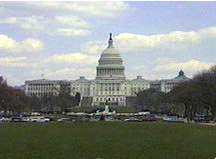White House Says It Is A Leading Collaborative, Responsible,
and Constructive Use of Space
 President Obama (pictured,
right) announced the administration’s new National Space
Policy Monday. The policy expresses the President’s direction
for the nation’s space activities, and articulates what the
President says is his commitment to reinvigorating U.S. leadership
in space for the purposes of maintaining space as a stable and
productive environment for the peaceful use of all nations.
President Obama (pictured,
right) announced the administration’s new National Space
Policy Monday. The policy expresses the President’s direction
for the nation’s space activities, and articulates what the
President says is his commitment to reinvigorating U.S. leadership
in space for the purposes of maintaining space as a stable and
productive environment for the peaceful use of all nations.
In a news release, the White House said that the decades that
followed the cold-war space race have seen a radical transformation
in the way we live our daily lives, in large part due to our use of
space. The growth and evolution of the global economy have ushered
in an ever-increasing number of nations and organizations using
space to observe and study our Earth, create new markets and new
technologies, support operational responses to natural disasters,
enable global communications and international finance, enhance
security, and expand our frontiers. The impacts of the utilization
of space systems are ubiquitous, the White House says, and
contribute to increased transparency and stability among
nations.
"Our policy reflects the ways in which our imperatives and our
obligations in space have changed in recent decades," President
Obama said in a statement when he unveiled the policy. "No longer
are we racing against an adversary; in fact, one of our central
goals is to promote peaceful cooperation and collaboration in
space, which not only will ward off conflict, but will help to
expand our capacity to operate in orbit and beyond. In addition,
this policy recognizes that as our reliance on satellites and other
space-based technologies increases, so too does our responsibility
to address challenges such as debris and other hazards. No longer
is space just a destination to reach; it is a place where we must
be able to work in ways that are responsible, sustainable, and
safe. And it is central to our security and the security of our
allies, as spaced-based technology allows us to communicate more
effectively, to operate with greater precision and clarity, and to
better protect our men and women in uniform."
"But, above all, this policy is about the boundless
possibilities of the future," Obama continued. "That is why we seek
to spur a burgeoning commercial space industry, to rapidly increase
our capabilities in space while bolstering America’s
competitive edge in the global economy. We are proposing improved
observation of the earth, to gain new insights into our environment
and our planet. We set ambitious goals for NASA: ramping up robotic
and human space exploration, with our sights set on Mars and
beyond, to improve the capacity of human beings to learn and work
safely beyond the Earth for extended periods of time. And this
policy recognizes the importance of inspiring a new generation of
young people to pursue careers in science and engineering. For,
ultimately, our leadership as a nation – in this or any
endeavor – will depend on them."
In the policy, President Obama states that:
- The United States remains committed to many long-standing
tenets in space activities. The United States recognizes the rights
of all nations to access, use, and explore space for peaceful
purposes, and for the benefit of all humanity.
- The United States calls on all nations to share its commitment
to act responsibly in space to help prevent mishaps,
misperceptions, and mistrust. The United States will take steps to
improve public awareness of government space activities and enable
others to share in the benefits of space through conduct that
emphasizes openness and transparency.
- The United States will engage in expanded international
cooperation in space activities. The United States will pursue
cooperative activities to the greatest extent practicable in areas
including: space science and exploration; Earth observations,
climate change research, and the sharing of environmental data;
disaster mitigation and relief; and space surveillance for debris
monitoring and awareness.
- The United States is committed to a robust and competitive
industrial base. In support of its critical domestic aerospace
industry, the U.S. government will use commercial space products
and services in fulfilling governmental needs, invest in new and
advanced technologies and concepts, and use a broad array of
partnerships with industry to promote innovation. The U.S.
government will actively promote the purchase and use of U.S.
commercial space goods and services within international
cooperative agreements.
- The United States recognizes the need for stability in the
space environment. The United States will pursue bilateral and
multilateral transparency and confidence building measures to
encourage responsible actions in space, and will consider proposals
and concepts for arms control measures if they are equitable,
effectively verifiable, and enhance the national security of the
United States and its allies. In addition, the United States will
enhance its space situational awareness capabilities and will
cooperate with foreign nations and industry to augment our shared
awareness in space.
- The United States will advance a bold new approach to space
exploration. The National Aeronautics and Space Administration will
engage in a program of human and robotic exploration of the solar
system, develop new and transformative technologies for more
affordable human exploration beyond the Earth, seek partnerships
with the private sector to enable commercial spaceflight
capabilities for the transport of crew and cargo to and from the
International Space Station, and begin human missions to new
destinations by 2025.
- The United States remains committed to the use of space systems
in support of its national and homeland security. The United States
will invest in space situational awareness capabilities and launch
vehicle technologies; develop the means to assure mission essential
functions enabled by space; enhance our ability to identify and
characterize threats; and deter, defend, and if necessary, defeat
efforts to interfere with or attack U.S. or allied space
systems.
- The United States will fully utilize space systems, and the
information and applications derived from those systems, to study,
monitor, and support responses to global climate change and natural
disasters. The United States will accelerate the development of
satellites to observe and study the Earth’s environment, and
conduct research programs to study the Earth’s lands, oceans,
and atmosphere.
 The Union of Concerned Scientists
calls the policy a return to the "traditional" U.S. positions first
articulated in administrations spanning President Carter to
President Clinton.
The Union of Concerned Scientists
calls the policy a return to the "traditional" U.S. positions first
articulated in administrations spanning President Carter to
President Clinton.
Experts at the Union of Concerned Scientists (UCS) point out
that the document language indicates how the Obama administration
will approach space security. They said that the administrations
public statements indicated that the new policy likely will
represent a return to a more international approach to space; a
more balanced view of civil, commercial and military uses of space;
and a greater openness to arms control and cooperative solutions to
international space security issues.
Laura Grego, a senior scientist with UCS's Global Security
Program, said in a statement before the official release of the
policy that "the Obama administration has decided to return to
policies that were in place during the Carter, Reagan, Bush senior
and Clinton years. The National Space Policy of each of those
administrations supported the right of all nations to use space
peacefully and without interference. And all of those
administrations viewed arms control agreements as useful tools to
ensure that right."
"The George W. Bush administration took the United States in a
radically different direction," she said. "It essentially embraced
a unilateral approach to space security, which was in keeping with
its overall foreign policy. It asserted that the right to use space
without interference was a U.S. right, and put strict limits on
arms control."
Grego said the UCS believes that the Obama administration's
approach to new arms control measures is critically important.
"There is no way we can achieve lasting space security
independently. We are going to have to coordinate and cooperate
with other spacefaring nations. That's the nature of space," she
said. "We also expect the new policy to do a better job than the
last one balancing military, civil, and commercial uses of space.
The Bush administration overemphasized military policy, and that
has had significant negative consequences. Overly broad export
controls over the last decade have held back our domestic space
industry in international competition. And they also have hampered
the United States' ability to cooperate with other countries on
civil space projects."
But Utah Republican Senator Orrin Hatch called the policy a move
in the wrong direction. “The Administration is yet again
trying to sell this country a failed space policy that irrevocably
diminishes our central role in space exploration," Hatch said in a
statement issued Monday. "The President says he is committed to
‘reinvigorating U.S. leadership in space,’ but what
he’s proposing makes us more dependent on Russia and other
nations. That’s not how I would define leadership.

“Furthermore, it’s hard to understand how the
President is committed to ‘a robust and competitive
industrial base,’ when he’s dismantling a proven and
effective space program that has propelled our nation to tremendous
heights," Hatch's statement continued. "In fact, the National
Aeronautics and Space Administration (NASA) has taken extraordinary
steps to terminate Project Constellation without Congressional
approval, and contrary to the law. I urge the President to rethink
this flawed policy, because while this might be a new direction for
manned space flight, it’s a direction we don’t want to
take.”
 SpaceX to Launch Inversion RAY Reentry Vehicle in Fall
SpaceX to Launch Inversion RAY Reentry Vehicle in Fall Aero-News: Quote of the Day (04.23.24)
Aero-News: Quote of the Day (04.23.24) Aero-News: Quote of the Day (04.20.24)
Aero-News: Quote of the Day (04.20.24) ANN's Daily Aero-Linx (04.20.24)
ANN's Daily Aero-Linx (04.20.24) Aero-News: Quote of the Day (04.21.24)
Aero-News: Quote of the Day (04.21.24)





